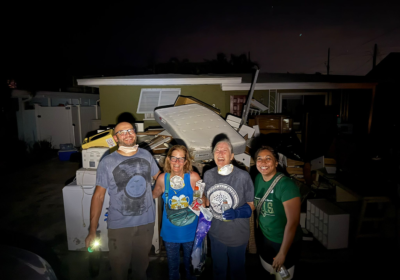Parking trackers aim to ease student frustrations

Parking trackers will be installed in Cresent Hill Parking garage this summer as a part of a pilot program. ORACLE PHOTO/CHAVELI GUZMAN
It’s a common scene among students: cars desperately circling around full parking garages and random cars following other students in hopes that they’re leaving. Parking is continuously one of the most contentious issues on campus, but a new Student Government (SG) initiative may prove to be useful in easing the current frustrations.
SG has secured funding to install parking trackers in some of USF’s parking locations. This initiative was originally started during former student body president Chris Griffin and former vice president Alec Waid’s 2016-17 term.
Moneer Kheireddine, current student body president, said the goal of the trackers is to help students save time.
“The parking trackers are going to give the availability of parking on every single level of the garage,” Kheireddine said. “So, right now we’re planning on implementing them in this pilot program for Crescent Hill as well as lots adjacent to Castor Hall, 17A and 17B. As a whole, the goal is to ensure that our students are well aware what spaces are available in our parking garages or parking lots. That way when students come in they don’t have to waste their time going into a parking garage when it’s already full.”
The funding for the trackers originated from sources unrelated to student tuition or fees according to Kheireddine. Rather, the $900,000 to a million will come from state funds.
“The funding comes from basically a general fund we use for special projects on campus,” Kheireddine said. “There’s a certain amount that’s allocated to every university. Chris and Alec worked with the Board of Trustees (BOT) to secure the funding from it. They secured $900,000 to a million dollars for it.”
According to Kheireddine, the trackers will be built this summer when the traffic will be less heavy.
“They’ll be installed when the traffic is a lot lower and once those are built and installed, we’ll see how the traffic is going, how students are feeling about it and hopefully work with our administration to implement them in all garages,” Kheireddine said.
As with all SG initiatives, Kheireddine said they take extended amounts of time to come to fruition.
“Everything at our institution is going to take a while to get done,” Kheireddine said. “There’s a lot of red tape. There’s a lot bureaucracy in it. As a whole, the reason we decided to personally try on continuing on this path is because we believe we can get things done on campus, it just takes a little bit of time.”
Kheireddine said the traffic impact of the tracker installation will be made as minimal as possible, but traffic could be impacted in some ways.
“From my understanding, they’ll (parking garages and lots the trackers will be installed in) be shut down in waves,” Kheireddine said. “So, basically, a couple of the floors will go offline at a time, but there is a possibility for them to go permanently offline if they find they can’t do it in waves. That’s why they’re building it in the summer when there’s less traffic.”
Parking is an issue SG is well aware of Kheireddine said, but he said SG is working on other initiatives that will help alleviate the situation.
“We know that parking is an issue; we all face that issue on a daily basis,” Kheireddine said. “This is about finding the best way to accommodate because SG can’t just build a new parking garage, but we can do little things.”






